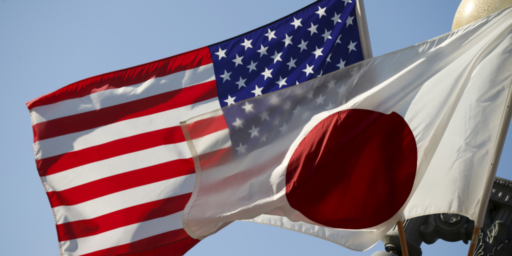CLARK ON THE AFTERMATH
Going through my site archives (I restored the old photgraphs, albeit smaller, and some other things) I stumbled across this WaPo editorial by Wesley Clark from March 23rd. He got much of it right, although his policy prescriptions of eight months ago are in stark contrast with what the Democratic field is saying now. After several paragraphs contrasting 1945 Japan with 2003 Iraq, he notes.
Almost none of those conditions will be present in post-Saddam Iraq. The country may have been diminished by years of sanctions and low-level conflict, and will have suffered military defeat, but strong groups appear ready to contest authority with the American force. This country has never had a unified national identity — even under the Ottomans it was three distinct provinces. Ethnic and religious animosities have been fueled by the mechanics of Saddam Hussein’s repression. Important regional cultures, wealth to be divided, and the need to resist or appease meddlesome neighbors threaten to tear Iraq apart.
Iraq’s long borders also present challenges. Its Islamic neighbors are anxious to compete for Iraqi loyalties. The Saudis and the Iranians will each be pulling separately, to say nothing of independent charities, some dedicated to fostering the kind of militant fundamentalism that is the source of America’s troubles in the region. And while neither Saudi oil money nor Iranian fundamentalism are quite the forces that they were a decade ago, the international network of terror and mobile bands of experienced, hardened fighters are more challenging to the conventional tools of statecraft and peacekeeping than anything MacArthur faced.
Iraq has no emperor to lend authority and cover for an American regent, who could be trapped in contradictions of our own making. Espousing self-determination for the Iraqi people, he will have to make decisions, order actions and implement changes himself. Each step will bring new winners and new losers. By establishing the institutions of democracy, such as a free press, he will be criticized as an infidel outsider. The American commander will preach the virtues of freedom of religion, while making sure that the mosques do not become centers of political resistance.
One danger: The groups that will appear most sympathetic and capable of assistance will likely be the defeated Iraqi armed forces themselves. Though these forces were former agents of repression, the United States might be tempted to call upon them for help — just as it summoned the armed forces in Haiti and the Serbian military in Bosnia despite their ill repute.
Meanwhile, in the United States, there will always be the impatience of the public, the intensive scrutiny of the international media and the parsimony imposed by competing budget and political requirements. The administration talks of a two-year transition to Iraqi rule. MacArthur spent 5-1/2 years in Japan.
Finally, there is no five-star MacArthur today — and maybe that’s for the best. We have many highly capable, well-educated generals — and Jay Garner is one of the best — but none of them alone can “do a MacArthur” and shouldn’t try. The search for such a figure is escapism, a desire to turn over responsibilities to someone, give him a title — and few resources — and hope the problems go away. Isn’t this the height of wishful thinking?
It would be far better to recognize, as many are belatedly doing, that victory in Iraq will come not from fighting alone but rather from what happens afterward. And for this we must gather legitimacy from institutions such as the United Nations and NATO. We will need a substantial international military presence there for years. We need resources to rebuild the state structures of Iraq with new faces and skills. And we must exercise the patience to allow democracy to emerge slowly. Above all, we must not use our presence in Iraq as a launching pad for self-glorification, imperial pretenses or further expeditions but as an opportunity to strengthen the international institutions that we have spent more than 50 years developing and nourishing.




